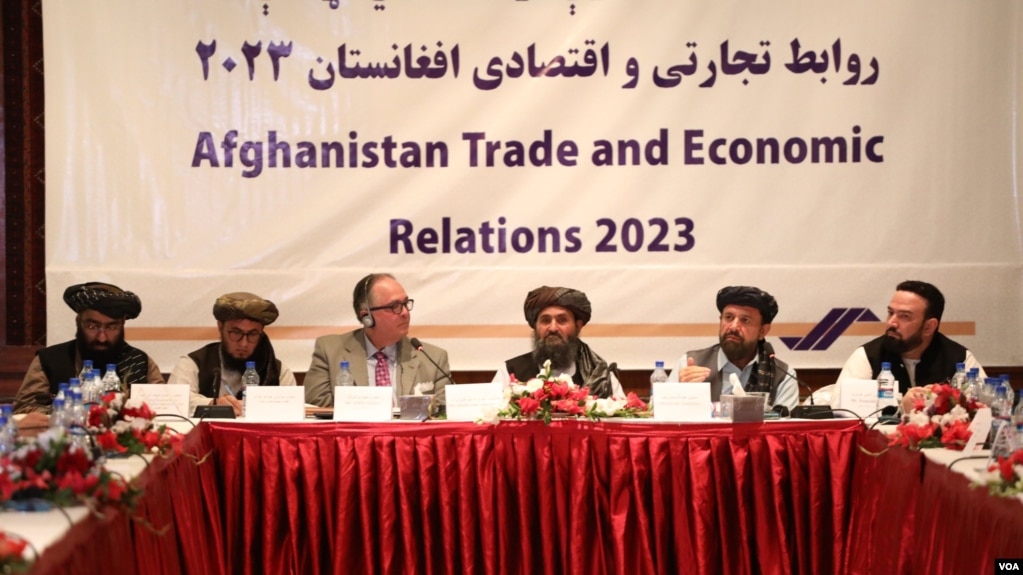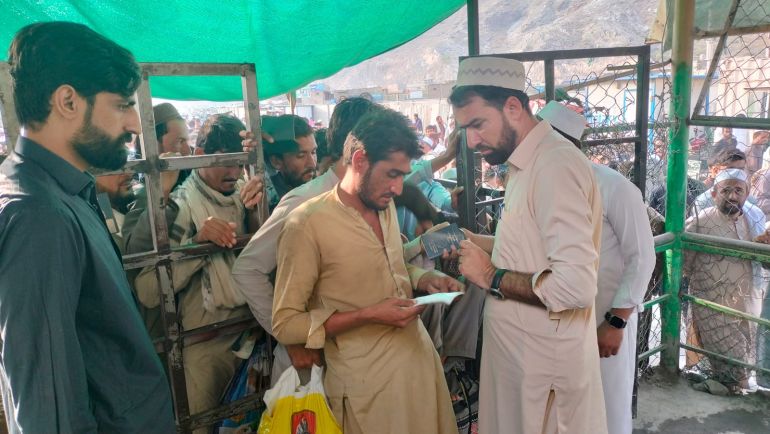ISLAMABAD — An American private sector delegation opened meetings in Afghanistan with officials and local counterparts Wednesday in the first interaction since the Taliban seized power from a U.S.-backed government two years ago.
Jeffrey Grieco, president of the Afghan American Chamber of Commerce, or AACC, in the United States, is leading the delegation.
Addressing a televised meeting in Kabul of business representatives that Greico co-hosted with Taliban Deputy Prime Minister for Economic Affairs Abdul Ghani Baradar, he said the U.S. government backs the visit.
A spokesperson from the U.S. State Department acknowledged that a delegation from the American Chamber of Commerce in Afghanistan and “individuals with business interests” had traveled to Kabul.
“The United States stands with the people of Afghanistan as they work to rebuild their economy,” the spokesperson told VOA in an emailed statement.
American businessman Grieco credited de facto Afghan authorities for establishing peace in the country, saying they have also “greatly eliminated” corruption. “It’s not all gone, but it’s mostly gone.”
He said his team is seeking to elevate private sector activities and explore ways to ease hardships facing Afghans over the past two years.
“The next year is going to be equally hard as the donors are reducing funding for Afghanistan, both humanitarian food security and other funding, at a key moment when Afghanistan needs funding for humanitarian purposes,” he said.
On Tuesday, the U.N. World Food Program announced that a “massive funding shortfall” had forced it to cut rations for 10 million people in the country this year, warning that time is running out to avert catastrophe in Afghanistan.
“The private sector can be a powerful agent of change and an agent of support when a country like Afghanistan is suffering,” Grieco said at the event, where local women business leaders were also in attendance.
“We think that business is the way to increase knowledge and increase more program activities for the core in Afghanistan, and you are great examples for us,” he told the Afghan female participants.
Barader said in his keynote speech that his government had established nationwide “comprehensive security” and “straightforward investment regulations” to attract domestic and foreign investments in Afghanistan.
The Taliban deputy prime minister cited several mining contracts signed in Kabul last month with Asian and European investors, including some from China, Turkey, Iran and Britain, worth almost $6.5 billion.
Grieco pledged to work closely with Bradar’s office to promote business-to-business ties, stressing the need for the Taliban to ensure security and protection of investment assets.
“What we saw and heard this week is that the Emirate government is ready for a market-based economic system for Afghanistan,” Grieco said, using the official title of the Taliban administration, the “Islamic Emirate of Afghanistan.”
“The last [Afghan] government didn’t even understand what a market-based economic system is,” he said.
The president of the U.S.-based AACC said his team has been working in Washington with banking sector representatives to help facilitate the return of Afghanistan’s frozen foreign exchange reserves of about $9 billion.
Grieco explained to the audience that the funds are in the U.S. central bank and European countries. He noted that the money cannot be returned to Afghanistan’s central bank for the time being due to economic sanctions on the Taliban.
“We need the Afghan Bankers’ Association to work tougher now to figure out how to approach the return of the commercial bank assets because there has been a change in our government’s thinking in the last few months,” Grieco said. “They are now willing to consider the return of those assets.”
While speaking to the Kabul gathering, Arthur Groom, a longtime international gemstone investor in Afghanistan, said that while some U.S. investors left the country after the Taliban takeover, his company stayed.
“We need to change some minds … because all I have heard here in many meetings is that it’s not safe here, women are not happy here, and the kids aren’t going to the schools, it’s dirty here. It’s completely opposite from what I saw,” Groom said.
Groom said his investment in Afghanistan aims to bring technology into the country to modernize the mining sector and teach modern technology in gem-cutting to enable locals, including the government, to benefit from their natural resources.
The Taliban reclaimed power in August 2021 as the U.S.-led NATO troops withdrew from the country after almost 20 years of war with the then-Taliban insurgents.
The new fundamentalist authorities have since imposed their strict interpretation of Islamic law, known as Sharia, banning girls from schools beyond the sixth grade, barring many women from workplaces, including those working for aid agencies, and prohibiting their entry into public parks, gyms and bathhouses.
The restrictions have deterred the international community from recognizing the Taliban government. However, Afghanistan’s neighbors and many regional countries have retained or reopened their embassies in Kabul following the power shift two years ago.
The Taliban said they had established peace in Afghanistan and almost eliminated illicit narcotics production to address international concerns, arguing that their policies align with Afghan culture and Islam.
“The rest is our internal matter, and no one should interfere in it like we don’t interfere in other countries’ affairs,” Taliban Foreign Minister Amir Khan Muttaqi said last week in a speech in Kabul in response to criticism of their treatment of Afghan women and other alleged human rights abuses.
The U.S. State Department spokesperson said in remarks to VOA that it continues to advise U.S. citizens against traveling to Afghanistan because of civil unrest, armed conflict, crime, terrorism and kidnapping. “The Department of State assesses that the risk of kidnapping or violence against U.S. citizens in Afghanistan is high,” the spokesperson said.
 Afghanistan Peace Campaign
Afghanistan Peace Campaign
